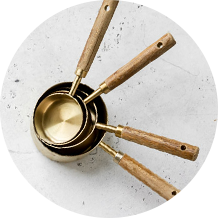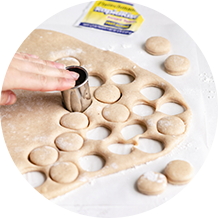If you’re just getting started, here are some of the most helpful tools and baking utensils to keep in your kitchen for quick and easy baking.

Measuring Spoons and Cups
Don’t “eyeball” the amount you need — use measuring spoons and cups for accuracy. Level off dry ingredients with a knife or straight edge. For liquids, use a liquid-measuring cup placed on a flat surface.
Mixing Bowl
Any sturdy, 4-quart capacity bowl is fine.
Timer
This helps keep track of proofing, resting and bake times. You can even use your phone’s timer so you don’t need to be near the kitchen.
Serrated Knife
Always helpful for cutting bread without squashing the loaf.
Thermometer
When you bake with yeast, it’s crucial that water temperature is accurate. Water that is too hot can kill your yeast. Look for a thermometer with a stainless-steel stem, a dial or digital readout.
Wire Cooling Rack
The steam that builds up in the pan can make bread loaves soggy. A wire cooling rack helps bread cool down when it’s just come out of the oven.
Plastic Wrap
Keep on hand to cover the dough as it rises. Plastic wrap should be sprayed with cooking spray on the side of the wrap facing the dough. A clean tea towel can also be used to cover dough.
Baking Pans
Common sizes are 9" x 5" or 8 ½" x 4 ½". Keep in mind that shiny pans reflect heat, so baking time is generally longer. You’ll also get lighter crusts than breads baked in dark pans that absorb heat.
Wooden or Metal Spoon
A long-handled spoon is required; either wood or metal will do.

Dough Hook
The dough hook is used to knead dough with hand or stationary mixers right in the bowl. Use the flat paddle to mix the ingredients, and then switch to the dough hook for kneading.
Food Processor
Perfect for mixing dough as well as for beating cake batter, egg whites and more.
Stand Mixer
Compared to hand mixers, a stand mixer is a more convenient, faster and mess-free appliance that’s great for taking your baking to the next level.
Pastry Brush
This tool makes it easy to apply egg washes and thin glazes, and ensures even application.
Rolling Pin
Use for rolling out cinnamon rolls and pizzas. A heavier weight rolling pin will make rolling dough out even easier.
Rubber Spatula
Use its flexibility to scrape dough from the sides of the bowl without scratching it.
Ruler
Helpful when you need to measure dough after it has been rolled.
Bench Scraper
Choose an inexpensive plastic or metal option for gathering loose dough, scraping bowls clean and dividing up dough.
Oven Thermometer
Oven temperatures can vary, so leave an oven thermometer inside to gauge the actual temperature of your oven.
Straight Blade
Great for scoring the tops of loaves. A sharp, non-serrated knife will work, too.
If you’re just getting started, here are some of the most helpful tools and baking utensils to keep in your kitchen for quick and easy baking.
Measuring Spoons and Cups
Don’t “eyeball” the amount you need — use measuring spoons and cups for accuracy. Level off dry ingredients with a knife or straight edge. For liquids, use a liquid-measuring cup placed on a flat surface.
Mixing Bowl
Any sturdy, 4-quart capacity bowl is fine.
Timer
This helps keep track of proofing, resting and bake times. You can even use your phone’s timer so you don’t need to be near the kitchen.
Serrated Knife
Always helpful for cutting bread without squashing the loaf.
Thermometer
When you bake with yeast, it’s crucial that water temperature is accurate. Water that is too hot can kill your yeast. Look for a thermometer with a stainless steel stem, a dial OR digital readout.
Wire Cooling Rack
The steam that builds up in the pan can make bread loaves soggy. A wire cooling rack helps bread cool down when it’s just come out of the oven.
Plastic Wrap/Non-Stick Tea Towel
Keep on hand to cover the dough as it rises. Plastic wrap should be sprayed with cooking spray on the side of the wrap facing the dough.
Baking Pans
Common sizes are 9" x 5" or 8 ½" x 4 ½". Keep in mind that shiny pans reflect heat, so baking time is generally longer. You’ll also get lighter crusts than breads baked in dark pans that absorb heat.
Wooden or Metal Spoon
A long-handled spoon is required; either wood or metal will do.
Dough Hook
The dough hook is used to knead dough with hand or stationary mixers right in the bowl. Use the flat paddle to mix the ingredients, and then switch to the dough hook for kneading.
Food Processor
Perfect for mixing dough as well as for beating cake batter, egg whites and more.
Stand Mixer
Compared to hand mixers, a stand mixer is a more convenient, faster and mess-free appliance that’s great for taking your baking to the next level.
Pastry Brush
This tool makes it easy to apply egg washes and thin glazes, and ensures even application.
Rolling Pin
Use for rolling out cinnamon rolls and pizzas. A heavier weight rolling pin will make rolling dough out even easier.
Rubber Spatula
Use its flexibility to scrape dough from the sides of the bowl without scratching it.
Ruler
Helpful when you need to measure dough after it has been rolled.
Bench Scraper
Choose an inexpensive plastic or metal option for gathering loose dough, scraping bowls clean and dividing up dough.
Oven Thermometer
Oven temperatures can vary, so leave an oven thermometer inside to gauge the actual temperature of your oven.
Straight Blade
Great for scoring the tops of loaves. A sharp, non-serrated knife will work, too.